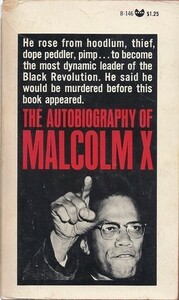You need to sign in or sign up before continuing.
Take a photo of a barcode or cover
challenging
emotional
funny
hopeful
informative
inspiring
reflective
sad
medium-paced
Definitely a read that everyone should make, especially to see the difference between Malcolm's own words and how media has portrayed him all these years.
challenging
dark
emotional
informative
reflective
sad
fast-paced
emotional
informative
inspiring
reflective
tense
slow-paced
challenging
reflective
slow-paced
challenging
informative
inspiring
reflective
medium-paced
What else is there to say? This is the autobiography of firebrand and truth teller Malcolm X. Every American should read this book.
Had to return to the library and haven’t had a chance to pick it back up
inspiring
reflective
medium-paced
challenging
dark
informative
inspiring
reflective
tense
medium-paced
First comment: I learned so much from reading this book.
Second comment: I'm not sure that I'm happy to have learned some of it.
So, I was alive (in junior high school) when Malcolm X was assassinated; I knew who he was and I'm pretty sure I remember being a bit tainted by the "chickens coming home to roost" comment after President Kennedy was killed. I totally get it now, but I was a young Catholic and Kennedy's assassination was a big deal in my family and especially for the four elderly Irish Catholic siblings whose home I went to for lunch all through grade school. Kennedy was like family to Frances, Josie, Tom and Jim Collins. I'm going to guess that was about all I knew of Malcolm X.
The thing that I was really struck by was learning that there was a difference between the philosophy/religion of the Muslim faith as it was practiced in the United States. I was aware that people such as Cassius Clay made the transformation to Mohammed Ali, but I had no clue that a component of the faith was believing that the white man was Satan. I was happy for the reduction in white guilt that I was able to feel when Malcolm X made his journey to Mecca and came back to the US without that aspect of his faith.
The part that I wasn't happy to learn was the part in which he discusses the differences between Johnson and Goldwater. I'd always thought that because of Kennedy's death, Johnson was able to pass Civil Rights legislation that wouldn't have necessarily passed under Kennedy. Malcolm X tells us the first person that Johnson called for help, upon gaining the presidency, was his friend Richard "Dicky" Russell of Georgia. I had to look up the name, having never heard of him and found that he had been a major obstacle to any kind of civil rights legislation throughout his career. So, I don't know, wouldn't Johnson have to talk to someone who had been the major opponent?
It's a lot to think about.
Second comment: I'm not sure that I'm happy to have learned some of it.
So, I was alive (in junior high school) when Malcolm X was assassinated; I knew who he was and I'm pretty sure I remember being a bit tainted by the "chickens coming home to roost" comment after President Kennedy was killed. I totally get it now, but I was a young Catholic and Kennedy's assassination was a big deal in my family and especially for the four elderly Irish Catholic siblings whose home I went to for lunch all through grade school. Kennedy was like family to Frances, Josie, Tom and Jim Collins. I'm going to guess that was about all I knew of Malcolm X.
The thing that I was really struck by was learning that there was a difference between the philosophy/religion of the Muslim faith as it was practiced in the United States. I was aware that people such as Cassius Clay made the transformation to Mohammed Ali, but I had no clue that a component of the faith was believing that the white man was Satan. I was happy for the reduction in white guilt that I was able to feel when Malcolm X made his journey to Mecca and came back to the US without that aspect of his faith.
The part that I wasn't happy to learn was the part in which he discusses the differences between Johnson and Goldwater. I'd always thought that because of Kennedy's death, Johnson was able to pass Civil Rights legislation that wouldn't have necessarily passed under Kennedy. Malcolm X tells us the first person that Johnson called for help, upon gaining the presidency, was his friend Richard "Dicky" Russell of Georgia. I had to look up the name, having never heard of him and found that he had been a major obstacle to any kind of civil rights legislation throughout his career. So, I don't know, wouldn't Johnson have to talk to someone who had been the major opponent?
It's a lot to think about.
It's shocking how much of what Malcolm X wrote about is still true and happening. Incredible read, an absolute must.




